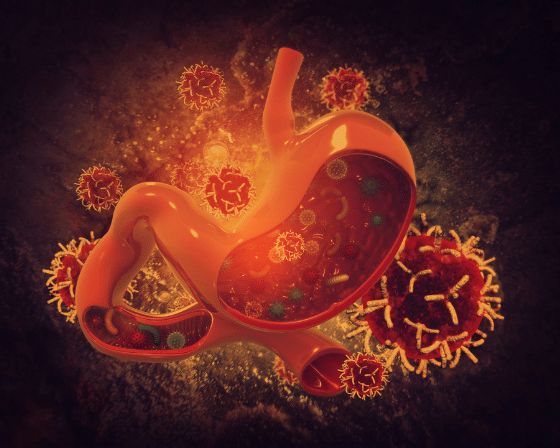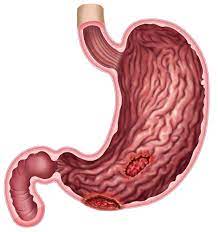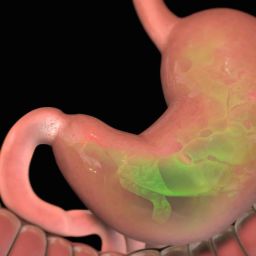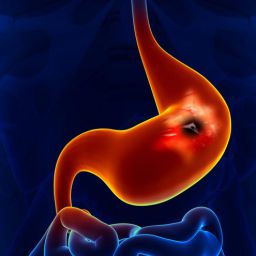
1. Mechanisms Through Which Stress May Affect Ulcer Development
Stress may not directly cause ulcers, but it can certainly influence the factors that lead to their formation. Stress affects the body in several ways, and its impact on the gastrointestinal system can increase the likelihood of ulcers. Here are the main mechanisms by which stress influences ulcer development:
1. Increased Stomach Acid Production

When the body is under stress, the “fight or flight” response is activated, triggering the release of hormones like adrenaline and cortisol. These hormones increase heart rate, blood pressure, and metabolic activity, preparing the body for immediate physical action. However, this response also increases the production of stomach acid.
Excessive stomach acid is one of the primary factors that can damage the stomach lining, especially when it exceeds the capacity of the stomach’s protective mechanisms. This overproduction of acid can lead to irritation, inflammation, and eventually ulceration. In individuals who already have a weakened mucosal lining due to H. pylori or NSAID use, the increased acid production from stress can trigger or worsen ulcer formation.
2. Impaired Blood Flow to the Stomach
Stress activates the body’s sympathetic nervous system, which directs blood flow away from non-essential organs and toward the muscles and heart. This response is designed to prepare the body for a perceived threat, but it can have a detrimental effect on the gastrointestinal system. Reduced blood flow to the stomach impairs its ability to repair and maintain its protective lining, leaving it more vulnerable to damage from stomach acid.
Chronic stress, especially when experienced over long periods, can lead to consistent reductions in blood flow to the stomach, increasing the risk of ulcer development.
3. Impact on Digestion
Stress has a significant effect on digestion. When the body is under stress, digestion can become slower and less efficient, leading to food staying in the stomach longer. This delay in digestion means that food and stomach acid are in contact for extended periods, increasing the likelihood of irritation and ulcer formation.
Additionally, stress can lead to poor eating habits, such as overeating or consuming spicy, fatty, and acidic foods, which can exacerbate the problem. These dietary factors, combined with stress-induced changes in the stomach’s acid production, can contribute to the development of ulcers.
4. Changes in Gut Microbiota
Emerging research suggests that stress can alter the balance of gut bacteria, which play a key role in maintaining digestive health. The gut microbiota helps protect the stomach lining and supports immune function. Stress can disrupt this balance, potentially leading to an overgrowth of harmful bacteria such as H. pylori, which increases the risk of ulcers.
Furthermore, stress can impair the gut’s ability to heal itself, making it harder for existing ulcers to heal and increasing the risk of complications.
5. Behavioral Factors: Smoking and Alcohol
Stress can also contribute to unhealthy lifestyle behaviors, such as smoking and excessive alcohol consumption. Both smoking and alcohol irritate the stomach lining, increase stomach acid production, and impair the healing process, all of which heighten the risk of ulcer formation.
People under stress may also be more likely to engage in overeating or consuming unhealthy foods that can irritate the gastrointestinal tract. These behaviors can make the stomach more susceptible to damage and ulcer development.
2. Stress and the Healing of Existing Ulcers
Stress not only increases the risk of ulcer formation, but it can also interfere with the healing process of existing ulcers. When the body is stressed, the release of cortisol suppresses the immune system and decreases the ability of the stomach to repair itself. Additionally, the stress-induced increase in stomach acid production can worsen the condition of existing ulcers, leading to prolonged discomfort and complications such as bleeding or perforation.
In individuals with chronic stress, ulcers may take longer to heal, or they may recur more frequently. This can lead to a cycle of ulcer formation and healing, with stress exacerbating the process.
3. Psychological Stress and the Risk of Ulcers

While physical stress (such as illness or injury) is a known factor in ulcer development, psychological stress is also a significant contributor. Chronic psychological stress, including anxiety, depression, and emotional strain, can lead to lasting changes in the body that increase the risk of ulcers.
For example, individuals with high levels of anxiety may be more likely to engage in behaviors such as smoking, drinking alcohol, and consuming unhealthy foods, all of which are risk factors for ulcers. Moreover, prolonged emotional stress can trigger the release of stress hormones that impact digestion, leading to changes in stomach acid production and reduced blood flow to the stomach.
In addition, stress can contribute to conditions like gastroesophageal reflux disease (GERD), which can increase the risk of esophageal ulcers. In fact, the constant irritation of the esophagus by stomach acid due to stress and anxiety can damage the tissue and lead to ulceration.
4. Managing Stress to Prevent Ulcers
Given the significant role that stress plays in ulcer formation and healing, managing stress effectively is key to both preventing ulcers and improving the healing process for existing ulcers. Here are some strategies for managing stress:
1. Relaxation Techniques
Practices like meditation, deep breathing exercises, yoga, and progressive muscle relaxation can help activate the body’s relaxation response, counteracting the effects of stress and reducing the production of stress hormones. Regular practice of these techniques can help prevent the chronic stress response that leads to ulcers.
2. Regular Exercise
Engaging in regular physical activity, such as walking, swimming, or cycling, can help reduce stress, improve mood, and support overall gastrointestinal health. Exercise increases endorphin production, which helps improve mental well-being and reduce the negative impacts of stress on the body.
3. Dietary Adjustments
Maintaining a balanced diet that includes whole foods, fiber, and a variety of fruits and vegetables can support overall health and reduce stress on the digestive system. Avoiding or limiting caffeine, spicy foods, alcohol, and high-fat or fried foods can also help reduce stress-related gastrointestinal discomfort and prevent ulcers.
4. Seeking Professional Support
If stress is overwhelming and difficult to manage on your own, seeking support from a therapist or counselor can be highly beneficial. Cognitive-behavioral therapy (CBT) and other forms of therapy are effective in addressing the root causes of stress and teaching coping mechanisms.
5. Medical Treatment
For those experiencing ulcers, medical treatment may include proton pump inhibitors (PPIs) or H2 blockers to reduce stomach acid, antibiotics to treat H. pylori infection, and medications to help protect the stomach lining. Your healthcare provider may also recommend lifestyle changes or stress management techniques as part of your treatment plan.
Stress is an important contributing factor to the development of ulcers. While it does not directly cause ulcers, it can exacerbate existing risk factors and promote ulcer formation by increasing stomach acid production, impairing blood flow to the stomach, and influencing unhealthy behaviors like smoking and excessive alcohol consumption. Managing stress through relaxation techniques, exercise, dietary changes, and seeking professional help is crucial in reducing the risk of ulcers and improving healing for those who already have them. If you are experiencing symptoms of an ulcer or are concerned about stress-related gastrointestinal issues, it is essential to consult with a healthcare provider for proper diagnosis and treatment.



